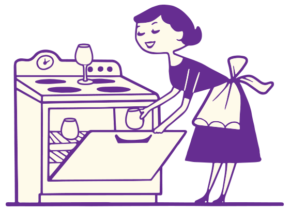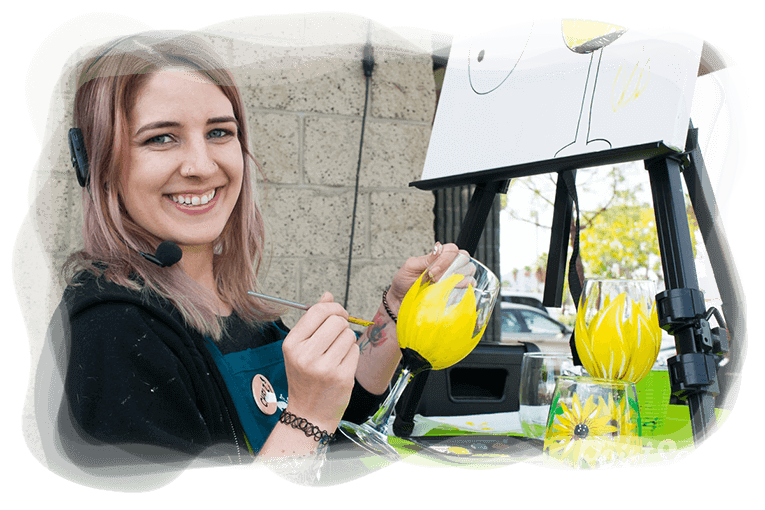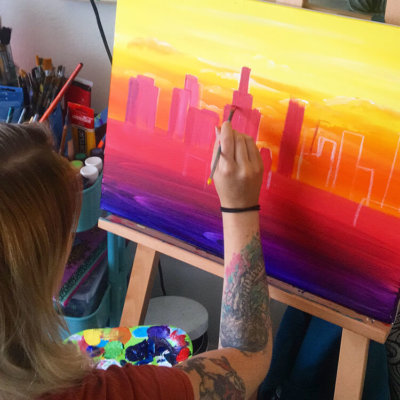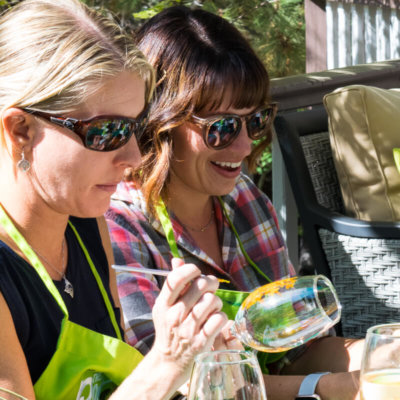
How to cure the paint on your painted glassware.
The glassware paint we use is permanent after air drying for 21 days or can be baked to expedite permanence. For glass that will be washed in the top rack of the dishwasher, cure the item in the oven; glassware cured using the air-dry method is not safe for use in the top rack of the dishwasher.
 Bake-to-Cure Method (Oven)
Bake-to-Cure Method (Oven)
- Allow painted glass project to dry at least one hour. Make sure the paint is dry to the touch before baking.
- Place your glasses in a cool oven.
- Set oven to 350° F and bake for 30 minutes. Turn oven off.
- Allow glass project to cool down in the oven to room temperature, then remove.
Care Instructions
Project can be Hand washed, or cleaned in the top rack of a standard, non-commercial dishwasher. Do not use in dishwasher if it has pot scrubbing features or top jets. Painted glass items are not microwave-safe.




When placing painted mason jars in cool oven to cure do I put them directly on a rack or a cookie sheet?
We’ve always placed our glass items directly on the oven rack, but if you are afraid of transfer either from the rack to the glass or the paint to the rack, then you could certainly place a piece of parchment paper on a cookie sheet and pop that right into the oven. 🙂
I have baked my glassware but adding another layer of paint, can I rebake?
how do you prepare hand painted glass for outdoor decor?
For outdoor decor, we suggesting using all purpose acrylic paint and using the air dry method to cure the paint. As far as preparing the glass surface, just make sure you wipe it down well before painting on it. Let it air dry for 3 weeks (21 days) and then your hand painted item should be good to endure the elements of the outdoors.
Hello Everyone, !!!
I hand painted some glasses, salt and pepper shakers, and a vinegar holder ( don’t know the proper name for it, as I am sure it has one…lol…), anyway this was several years ago, so it had plenty of drying ( curing time)…. and I was hand washing one of the glasses and the dots started coming off, after all this time….
So is the air dry curing not recommended .????
We recommend both, but the results may vary depending on the paints used and how often the item is handled. For items like wine glasses, vases and even salt & pepper shakers, I’d suggest the bake on method as it seals the paint in a little bit better. Keep in mind, if you are washing the items often, abrasion can occur resulting in chipping or paint coming off. Even printed glassware will chip after time. From my experience the baking method will give you the best results if your glassware requires regular washing.
Greetings,
I plan on making my daughter some marble painted glasses for her birthday and I’ve painted mason jars before but I usually spray a clear sealer over it, do I or can I do the same after the oven curing? Thanks in advance for your time.
If you are using paints meant for glass, you can oven bake and wont require an extra sealer as the baking process cures the paint onto the glass. The spray or brush on sealant method should only be used for items that wont be touching food or drinks. If you are painting glass items that you intend to use for food or drinks, such as plates or glasses, always opt for the oven cure method.
Can you oven cure if you added glitter to the cups?
Most glitters are made of plastic material which will tend to melt in the heat. I would suggest baking your glasses first then applying your glitter touches after the bake.
Hey, all! I wouldn’t use regular paint. I always use paint specifically for glass and dry for an hour, then proceed to bake in the oven. The paint is then waterproof.
How do I get a sheen on my hand painted wine glasses❓
Do you need a specific type of glass that is resistant up to 350 F?
I marbled my wine stems and cutes in oven. Having names put on with glass paint. Can I bake them again to set wording or will it mess up stems? Basically can you bake twice?
The items I want to paint are clear glass oil lamps. These items are handled infrequently, only for cleaning or refilling. That said, I would like to create a very durable surface that will stand the test of time. I was thinking about adding a clear laquor coating after baking the glass lamps (or some other appropriate clear coating that you might recommend), and then baking the glass again to make the clear coating as durable as possible. Thoughts on this process? Thanks!
In reference to Donny who seems to be the only person asking one of the most important questions….. I need to repeat this question as it still has not been answered.
Do we need to use a specific type of glass that can withstand the baking temperature and time in the oven???????????????
I have done a lot of research on this and everything says that non-tempered glass cannot withstand temperatures above 120c which to you is 250f. How can we cure our painted creations without ensuring it is all done on tempered glass??
I strongly feel that some advise needs to be given on this as this is one of the most vital points of glass painting
Curing is going to depend on the type of paint you are using. This can vary from one paint manufacturer to another. Carefully read the curing instructions on the paint container you are using. If you are using a glass paint like the kind we typically use, it’ll say to bake it (instructions above), or let it air dry for at least 20 days before use and avoid washing with an abrasive sponge or the dishwasher.
Are you unaware of how glass is manufactured?? It is a very high heat process. Any glass can withstand 350 degrees. The real issue is rapid change in temperatures, which can crack or break any type of glass. This is why you start it in a cold oven, bring it to temperature and then leave it in the oven until it is fully cooled.
Can I bake a glass item that has been painted with acrylic paint and brushed with varnish to cure it in the oven?
Generally speaking, I would only recommend to bake your glass if you used glass specific paint that is meant to be baked to cure. The instructions provided in this article are specific to the paint that we use / send out in our glassware painting kits.
Is the acrylic paint you used specific for glass? Is the varnish mean to be baked? This all really depends on the supplies you are using. I would carefully read the use instructions on your paint and varnish. If there’s no mention of baking to cure, then I suppose there’s only one way to find out… 😬 Good luck with your project. And if you do decide to bake it, come on back and share your results. Make sure to take before and after photos just in case.
I have an acrylic painted glass bowl with a wood base using wood glue to attach. How can I cure. It? Is ovenmethidoven method safe?
I would not bake anything with wood glued on. The oven bake method is only suggested for glass specific paint which allows for oven curing. I suggest reading the curing instructions on your paint container for curing information. Some paints allow for the air dry / cure method which after about 21 days or so the paint will self cure / adhere. This all depends on the specific use of the glassware and how much paint you have on the item. I’d suggest looking into clear coats for glass.